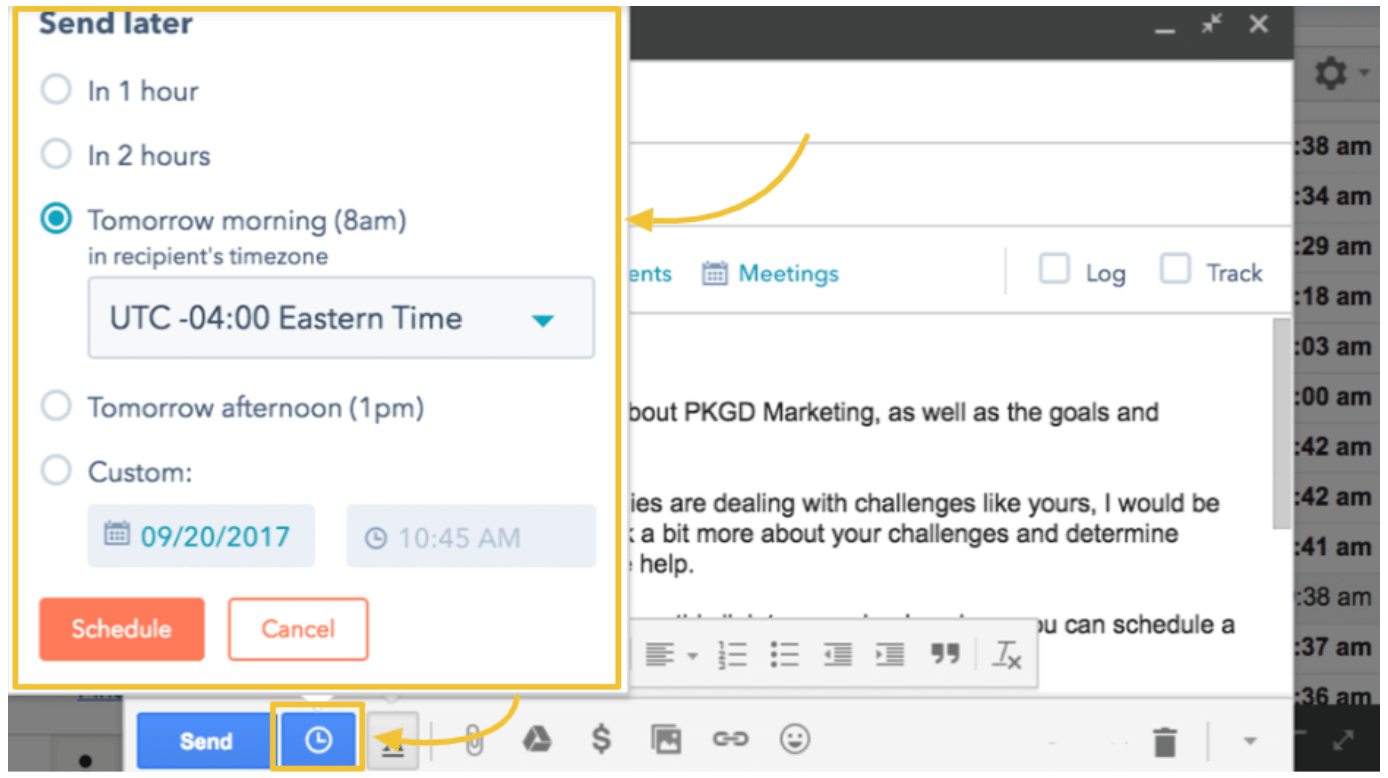5 Email Automation Tips to Boost Your Online Marketing Efforts
Emails are great for nurturing and building customer relationships, generating leads, sales, etc. Despite their efficacy, however, sending your emails manually will be a huge time-sucker. To improve your productivity and get better results out of your email marketing campaigns, you need to leverage automation.
Email automation lets you set up and deploy personalized, engaging email marketing campaigns that can almost run by themselves, saving you a huge amount of time and effort.
Set a consistent schedule
If you’ve figured out the best day and time to send your emails to your contact list, stick to it. A consistent schedule tells customers when to expect your emails, improving click-through and open rates.
It will also prevent you from scrambling to create and deliver your marketing emails, which can help you avoid missing out on sending email marketing campaigns with great potential for engagement and conversions.
Similar to how you would utilize employee scheduling software for your small business to streamline staff deployment, use email automation tools to plan and schedule the sending of your marketing messages easily.
For instance, if you have a HubSpot account, you can schedule as many emails as possible within your Gmail account.
After creating your email, click the Gmail compose window’s schedule icon and select or set a time and date.
In this guide, we’ll look into five email automation tips that can help bolster your email and online marketing initiatives.

Your scheduled emails are saved automatically as drafts, so you can update or edit them before the delivery date.
Automatically scheduling email delivery is helpful for calendared events such as virtual summits. You can systematize sending regular pre-summit reminders, payment acknowledgment messages, post-registration details, and more. With numerous concerns about managing your summit, email automation will greatly relieve you of these tedious communication tasks.
Establish a regular email delivery schedule to save you time and effort in the long run and regularly engage your subscribers.
Use compelling calls-to-action
Ensure your automated emails have a call to action (CTA) that tells your subscribers what to do next and encourages them to take action on your offer.
Make your CTA highly visible within your email content using a button color contrasting with its background.
Include short but compelling action words such as “Order,” “Buy,” or “Get now,” and ensure your CTA indicates the potential benefits customers can get from acting on your offers.
Remember that creating compelling CTAs in your newsletters can boost your SEO. For instance, from your automated emails containing snippets of your blog posts, you can direct subscribers to your website and increase your site traffic. For more clever SEO strategies to integrate with your email marketing, consult resources and experts such as Paul Teitelman. You’ll gain access to services such as keyword research, link building, local SEO, and more.
Additional tip: Add an email signature to your automated marketing emails. This helps you brand your message and reinforces your business identity.
Use signature generator tools such as Wisestamp, which lets you draw a handwritten signature using your touchpad, touchscreen, or mouse. You can download it for free.
An email signature can help build trust with your contacts, encouraging them to act on your offers and buy your products.
Segment your list
Email contact segmentation lets you get up close and personal with your subscribers.
It lets you sort your contacts into targeted groups, making sending them personalized email campaigns easier and gaining winning email marketing automation results.
Segment your contacts based on their demographics, preferences, and behavior to deliver the right emails to the right audiences at the best time.
Learn from these segmentation tips to help optimize your automated email marketing campaigns.
- Segmentation by interest. Know your customers’ interests and use that information to strengthen your relationships, sell more, add value to your offers, and increase product usage.
For instance, you can segment audiences based on the pages they visited and engaged with on your website. If your subscribers read your blog, segment them based on which blog they read and use link triggers to automatically send them related offers via email.
- Segmentation by engagement. Grouping your contacts based on their engagement levels with your email campaigns helps you target them with exclusive offers or incentives as appreciation for their loyalty.
It’s a great way to motivate them to engage with your brand and act on your email marketing offers more.
Most email marketing platforms offer essential audience segmentation features, but they might not always allow you to segment as specifically as you want. If they do, they might cost more than you’re comfortable paying.
One solution is to build your own app designed to customize your audience segmentation as specifically as possible.
Plus, a tailor-fit solution can easily scale with your email marketing efforts without the added cost of paying for more when your contact list grows.
If you build your app using Microsoft Azure DevOps, run frequent, automated backups with Backrightup. It’s a reliable service that helps protect your app’s code and data from server crashes, accidental deletions, and other issues that cause you to lose your data.
This keeps your data secure while saving you from performing manual, time-consuming Azure DevOps backups.
If you still have a small mailing list and wish to widen it, consider reaching out to large audiences on social media. You can do this fast by buying Instagram accounts, for instance, on secure marketplaces such as Social Tradia. Once you’ve gained access to these influential profiles, you can invite the users to subscribe to your emails.
Start segmenting your subscribers the minute you capture their email addresses to streamline the implementation of your automated email marketing campaigns and increase your conversion and sales opportunities.
Personalize your campaigns
Automating your email campaigns doesn’t mean sending your contacts generic email marketing content that sounds like it was created by a robot.
Most subscribers want to feel like they’re interacting with a human to make their experience with your business more personal.
Include personalization elements in your automated email content to make it more natural. One of the easiest ways to do this is to use your contacts’ names in the subject lines.
When customers see their names on the subject line, they can feel special and acknowledged, which helps you nurture relationships with them.
Besides your email subject line, use other personalization strategies across your email newsletters.
For example, the digital music service Spotify sends emails that notify users when artists they’ve liked or listened to on the app release new music.

Email automation personalization strategies such as this show that your brand goes the extra mile to send subscribers personalized content, boosting your audience engagement rate and, in turn, your sales.
Besides your marketing messages, personalize your customer service emails to improve your quality and the client’s experience with your brand.
Establish efficient workflows by integrating customer service email management software into your processes. This streamlines delivering personalized, memorable customer service experiences for your clients.
Primary Image Source: Envato Elements


